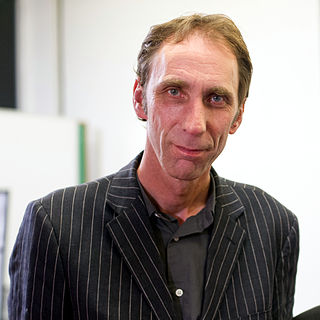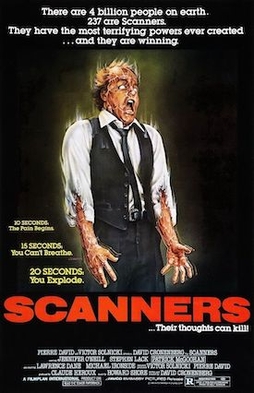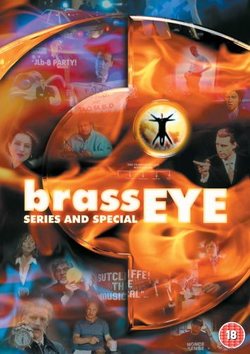Related Research Articles

David Paul Cronenberg is a Canadian film director and screenwriter. He is a principal originator of the body horror genre, with his films exploring visceral bodily transformation, infectious diseases, and the intertwining of the psychological, physical, and technological. Cronenberg is best known for exploring these themes through sci-fi horror films such as Shivers (1975), Scanners (1981), Videodrome (1983) and The Fly (1986), though he has also directed dramas, psychological thrillers and gangster films.

William Woodard Self is an English writer, journalist, political commentator and broadcaster. He has written 11 novels, five collections of shorter fiction, three novellas and nine collections of non-fiction writing. Self is currently Professor of Modern Thought at Brunel University London, where he teaches psychogeography.

Glenda May Jackson was an English actress and politician. Over the course of her distinguished career she received numerous accolades including two Academy Awards, two BAFTA Awards, three Emmy Awards, a Golden Globe Award, and a Tony Award. A member of the Labour Party, she served continuously as a Member of Parliament (MP) for 23 years, initially for Hampstead and Highgate from 1992 to 2010, and Hampstead and Kilburn from 2010 to 2015, following boundary changes.

Scanners is a 1981 Canadian science fiction horror film written and directed by David Cronenberg and starring Stephen Lack, Jennifer O'Neill, Michael Ironside, and Patrick McGoohan. In the film, "scanners" are psychics with unusual telepathic and telekinetic powers. ConSec, a purveyor of weaponry and security systems, searches out scanners to use them for its own purposes. The film's plot concerns the attempt by Darryl Revok (Ironside), a renegade scanner, to wage a war against ConSec. Another scanner, Cameron Vale (Lack), is dispatched by ConSec to stop Revok.
Censorship in the United Kingdom was at different times more or less widely applied to various forms of expression such as the press, cinema, entertainment venues, literature, theatre and criticism of the monarchy. While there is no general right to free speech in the UK, British citizens have a negative right to freedom of expression under the common law, and since 1998, freedom of expression is guaranteed according to Article 10 of the European Convention on Human Rights, as applied in British law through the Human Rights Act.

Index on Censorship is an organisation campaigning for freedom of expression, which produces a quarterly magazine of the same name from London. It is directed by the non-profit-making Writers and Scholars International, Ltd (WSI) in association with the UK-registered charity Index on Censorship, which are both chaired by the British television broadcaster, writer and former politician Trevor Phillips. Index is based at 1 Rivington Place in central London.

Sir Christopher James Hampton is a British playwright, screenwriter, translator and film director. He is best known for his play Les Liaisons Dangereuses based on the novel of the same name and the film adaptation. He has thrice received nominations for the Academy Award for Best Adapted Screenplay: for Dangerous Liaisons (1988), Atonement (2007) and The Father (2020); winning for the former and latter.

Mark Kermode is an English film critic, musician, radio presenter, television presenter, author and podcaster. He is the co-presenter, with Ellen E. Jones, of the BBC Radio 4 programme Screenshot and co-presenter of the film-review podcast Kermode & Mayo's Take alongside long-time collaborator Simon Mayo. He is a regular contributor to The Observer, for which he was chief film critic between September 2013 and September 2023.
James Alan Ferman was an American-British television and theatre director. He was the Secretary of the British Board of Film Classification from 1975 to 1999.

Crash is a 1996 Canadian erotic thriller film written, produced and directed by David Cronenberg, based on J. G. Ballard's 1973 novel of the same name. Starring James Spader, Deborah Kara Unger, Elias Koteas, Holly Hunter and Rosanna Arquette, it follows a film producer who, after surviving a car crash, becomes involved with a group of symphorophiliacs who are aroused by car crashes and tries to rekindle his sexual relationship with his wife.

Philip Neville French was an English film critic and radio producer. French began his career in journalism in the late 1950s, before eventually becoming a BBC Radio producer, and later a film critic. He began writing for The Observer in 1963, and continued to write criticism regularly there until his retirement in 2013.

Peter Suschitzky, A.S.C. is a British cinematographer and photographer. Among his most known works as director of photography are The Rocky Horror Picture Show, The Empire Strikes Back, and Mars Attacks! and the later films of David Cronenberg. Suschitzky succeeded Mark Irwin as Cronenberg's regular cinematographer when Irwin left during the pre-production of Dead Ringers (1988), and has been the cinematographer for all of Cronenberg's films since, with the exception of Crimes of the Future (2022). He has also collaborated with directors John Boorman, Ken Russell, Bernard Rose, and Tim Burton.

Lucien Bourjeily is an Emmy-nominated writer and director of both theater and film. His work has traveled the worldwide festival circuits and won him many awards of which the 2017 Dubai International Film Festival Jury Prize. He brought his progressive approach to theatre to London's LIFT Festival in 2012 with his hard-hitting immersive play "66 Minutes in Damascus" which was chosen as one of 10 plays in the world that "rethink the stage" by the Huffington Post.

The French Line is a 1953 American musical film starring Jane Russell made by RKO Radio Pictures, directed by Lloyd Bacon and produced by Edmund Grainger, with Howard Hughes as executive producer. The screenplay was by Mary Loos and Richard Sale, based on a story by Matty Kemp and Isabel Dawn. It was filmed in three strip technicolor and Dual strip polarized 3D during what many consider 3-D film's "golden era" of 1952-1954.

Shahriar Mandanipour (Persian: شهریار مندنی پور; also Shahriar Mondanipour is an Iranian writer, journalist and literary theorist.

Brass Eye is a British satirical television series parodying current affairs news programming. A series of six episodes aired on Channel 4 in 1997, and a further episode in 2001. The series was created and presented by Chris Morris, written by Morris, David Quantick, Peter Baynham, Jane Bussmann, Arthur Mathews, Graham Linehan and Charlie Brooker and directed by Michael Cumming.
Anthony Hayward is a British journalist and author. He is a regular contributor to The Guardian and The Daily Telegraph, and has written more than 20 books about television and film. The subjects of justice and censorship have been constant themes throughout his work. "Hayward is particularly good on conflicts with authority," wrote one critic reviewing his biography Which Side Are You On? Ken Loach and His Films.
Frank Scheck is an American film critic. He is best known for his reviews in the New York Post and The Hollywood Reporter. He formerly edited STAGES Magazine and worked as a theater critic for the Christian Science Monitor in the 1990s.

Trilby is a 1915 American silent drama film directed by Maurice Tourneur and starring Wilton Lackaye, Clara Kimball Young, and Paul McAllister. It is an adaptation of the 1894 novel Trilby by George du Maurier. The film's sets were designed by art director Ben Carré.
Martin Barker was a British scholar of media studies and cultural studies. He was an Emeritus Professor at Aberystwyth University, having previously taught at the University of the West of England and the University of Sussex. Over the course of his career he wrote or co-edited fifteen books. He was known for being one of the pioneers behind the concept of cultural racism, which he termed "new racism".
References
- ↑ Hughes, Scott (26 April 2001). "Arts: The worst movie ever?". The Guardian . p. 15.
- ↑ "Christopher Tookey". rottentomatoes.com. IGN Entertainment, Inc. Retrieved 30 March 2009.
- ↑ "Chris Tookey presenting The Film Programme, BBC Radio 4". Archived from the original on 7 February 2012.
{{cite web}}: CS1 maint: unfit URL (link) - 1 2 French, Philip (23 March 1997). "The week in Reviews: Censorship: Crash! No, not distant thunder - just film critics dropping clangers". The Observer . p. 013.
- ↑ French, Philip (25 May 1997). "Crash, there goes the censors' Berlin Wall". The Observer . p. 029.
- 1 2 Busfield, Steve; Dan Glaister (27 March 1998). "Analysis: Film censorship: They know what's good for you As Lolita is passed for release Steve Busfield and Dan Glaister see how the Daily Mail wages war on Britain's censors". The Guardian . p. 019.
- ↑ Glaister, Dan; Derek Malcolm (12 November 1996). "Inside Story: In search of depravity David Cronenberg's new film, Crash, has riled the right and provoked calls for censorship". The Guardian . pp. T.008.
- 1 2 Jonathan, Coe (6 June 1997). "There is no paedophilia or sexual humiliation in Crash. Neither is there any merit. But we should still defend it from the censors and moralists". New Statesman . p. 38.
- ↑ Tookey, Christopher (29 November 1996). "Letter: A Crash victim protests". The Guardian . p. 020.
- ↑ Tookey, Christpher (February 1997). "Crash, ban, wallop". Prospect (16). Retrieved 30 March 2009.
- ↑ "Hard Times - The Musical - Christopher Tookey & Hugh Thomas". The Guide to Musical Theatre. 10 February 2009. Archived from the original on 10 October 2010. Retrieved 30 March 2009. 30 March 2009.
- ↑ Sweeney, John (15 June 1997). "Death of an Islington man: A curry delivery man murdered in a gang war? So much for Neighbourhood Watch". The Observer . p. 005.
- ↑ French, Sean (18 September 1998). "Sean French (column)". New Statesman . p. 31.
- ↑ "Goodbye Mr French: Fleet Street cuts back its film critics | Comment | Sight & Sound: The International Film Magazine". 21 June 2018.